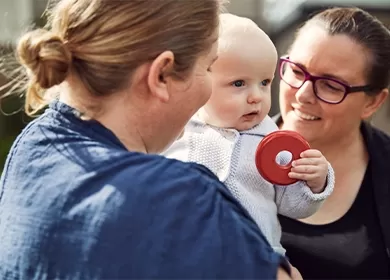Opinion: Celebrating the Milk of Human Kindness
By Adj. Prof. Stephen Cornelissen AM
CEO Australian Red Cross Lifeblood
There are few things more terrifying for a new mother than welcoming a baby too early into the world.
Parents of premature babies experience an overwhelming plethora of emotions: fear, dread, grief, dismay, and devastation. Having worked in health for more than 30 years, I know it is often the “wave” of community support that helps ride them over the difficult times.
It takes a village of support to help premature babies survive, and today Lifeblood wants to celebrate the 6000 mothers who have donated breast milk to our milk bank and helped thousands of premature babies.
Set up to save the most fragile amongst us, Lifeblood’s milk service helps babies born early premature or those with a low birth weight, supplying milk “on demand” to the babies who most need it. Some of these babies weigh little more than a litre of a milk and are unable to access their mother’s own milk.
The mothers of premature babies often face enormous feeding challenges, and donated breast milk is a bridge of support and motivation while their own milk supply is being established.
There are many reasons why a mother may be unable to breastfeed their preterm baby including having a low supply, a baby with allergies, or a maternal illness, and it’s in these situations where donated breast milk from other mothers is key.
For all new mothers, the emotional burden of providing enough nutrition for your baby can be enormous. From latching issues to painful feeding, the tears of frustration can flow faster than the milk itself. For many mothers with babies born too early, the stress of separation, the constant worry, and babies too little to breast feed, all make feeding an Everest-like goal.
These babies are at risk of a terrible gut disease called necrotizing enterocolitis (NEC), a leading cause of illness and death among preterm infants. The risk of NEC increases for the smallest babies if they are not fed human milk, either their mother’s own milk or donor milk, when they are small and sick.
Mothers who donate their milk show extraordinary stamina and motivation, collecting the milk day and night for weeks or months, following strict diet and sterilization protocols.
These donations truly are the milk of human kindness. When Lifeblood milk opened in 2018, more than three quarters of Australian early preterm babies didn’t have access to donated breast milk. Now, they almost all do.
But we still have more to do. Lifeblood will next year start contributing donated breast milk to clinical trials with mid to late-term premature babies as well as full-term babies, with the hope of demonstrating the health benefits that donated breast milk might have for all babies.
Donated breast milk is precious amongst mothers unable to provide enough milk for their babies. We have learned at Lifeblood that it is a resource with enormous untapped potential; Australia has a long way to go before it fully matches – and unlocks – the enormous generosity of Australians mothers willing to give it.
Whether or not you have milk to donate, you can play a part. Spread awareness about donating human milk, and if you’re a mother accumulating those extra litres, beyond what your baby needs after three months of age, donate them. You might just save a life.


